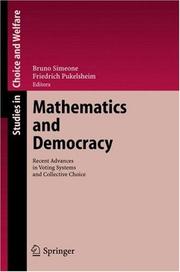| Listing 1 - 2 of 2 |
Sort by
|

ISBN: 1280744235 9786610744237 3540356053 3540356037 3642071333 Year: 2006 Publisher: Berlin ; New York : Springer,
Abstract | Keywords | Export | Availability | Bookmark
 Loading...
Loading...Choose an application
- Reference Manager
- EndNote
- RefWorks (Direct export to RefWorks)
Different quantitative approaches to the study of electoral systems have been developed: game-theoretic, decision-theoretic, statistical, probabilistic, combinatorial, geometric, and optimization ones. This book contains contributions from prominent scholars from these disciplines.
Voting --- Elections --- Social choice --- Mathematical models --- Polls --- Politics, Practical --- Suffrage --- Electoral politics --- Franchise --- Political science --- Plebiscite --- Political campaigns --- Representative government and representation --- Economic theory. --- Political science. --- Econometrics. --- Mathematics. --- Economic Theory/Quantitative Economics/Mathematical Methods. --- Political Science. --- Game Theory, Economics, Social and Behav. Sciences. --- Math --- Science --- Economics, Mathematical --- Statistics --- Administration --- Civil government --- Commonwealth, The --- Government --- Political theory --- Political thought --- Politics --- Science, Political --- Social sciences --- State, The --- Economic theory --- Political economy --- Economic man --- Game theory. --- Games, Theory of --- Theory of games --- Mathematics
Book
ISBN: 3540517979 0387517979 3540468102 9783540517979 Year: 1989 Volume: 1403 Publisher: Berlin ; Heidelberg : Springer-Verlag,
Abstract | Keywords | Export | Availability | Bookmark
 Loading...
Loading...Choose an application
- Reference Manager
- EndNote
- RefWorks (Direct export to RefWorks)
The C.I.M.E. Summer School at Como in 1986 was the first in that series on the subject of combinatorial optimization. Situated between combinatorics, computer science and operations research, the subject draws on a variety of mathematical methods to deal with problems motivated by real-life applications. Recent research has focussed on the connections to theoretical computer science, in particular to computational complexity and algorithmic issues. The Summer School's activity centered on the 4 main lecture courses, the notes of which are included in this volume:.
Discrete mathematics --- 519.1 --- 51 --- Combinatorics. Graph theory --- Mathematics --- Combinatorial optimization --- Congresses. --- 51 Mathematics --- 519.1 Combinatorics. Graph theory
| Listing 1 - 2 of 2 |
Sort by
|

 Search
Search Feedback
Feedback About UniCat
About UniCat  Help
Help News
News